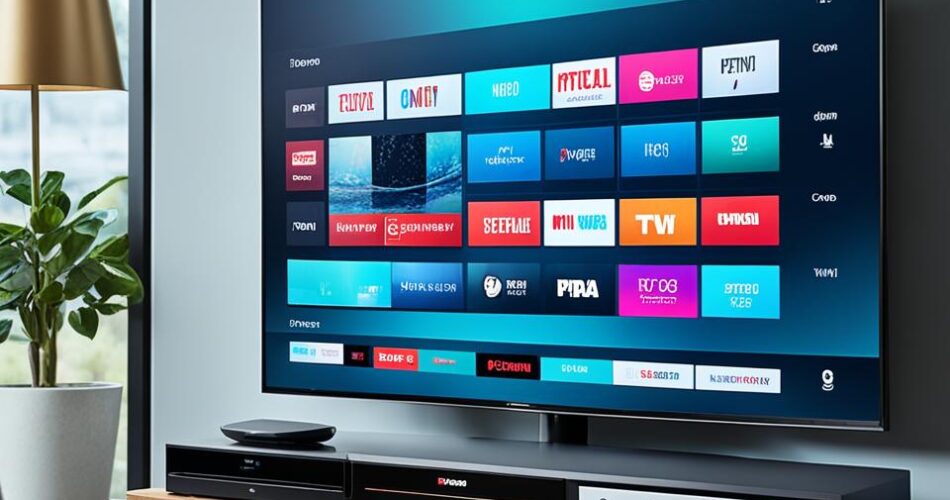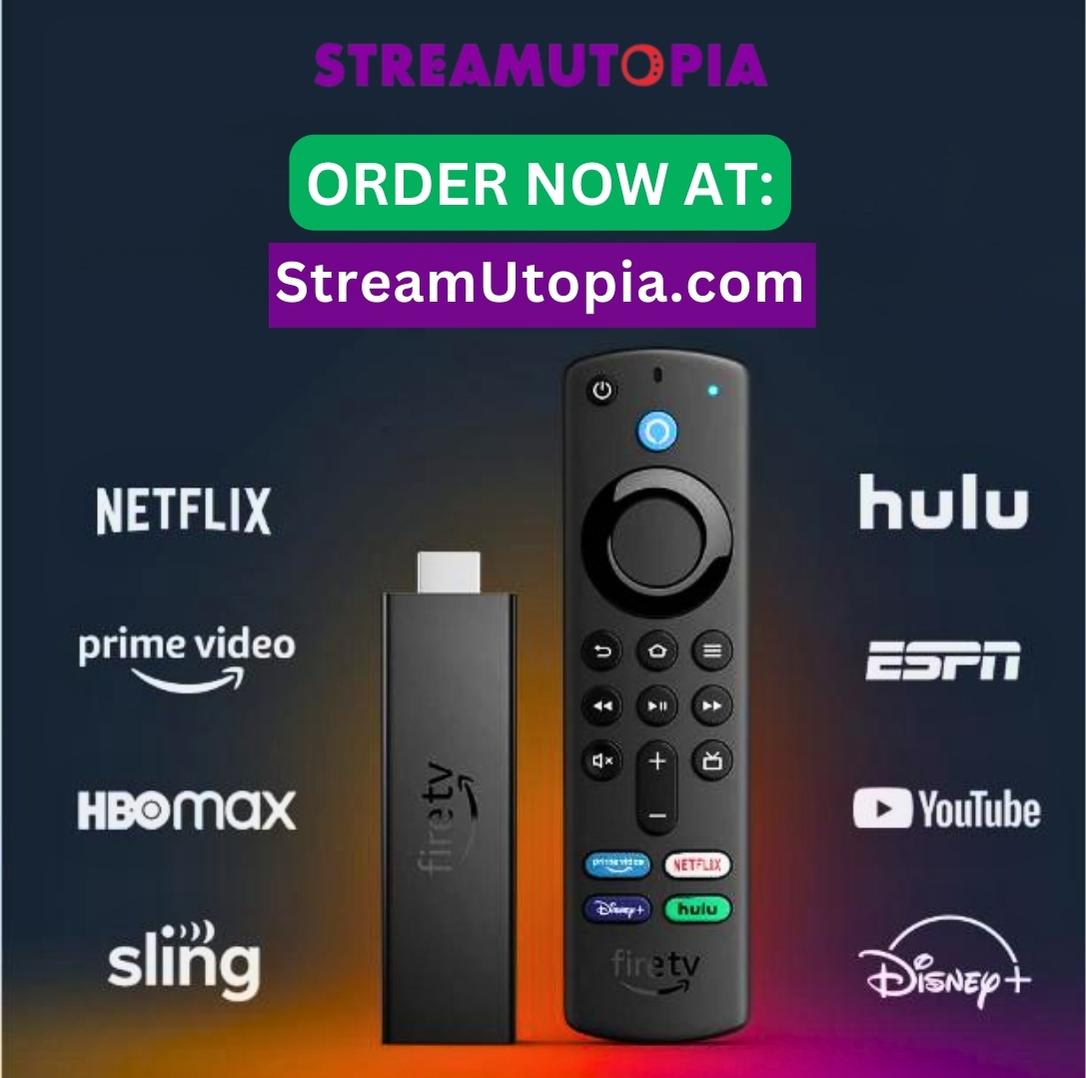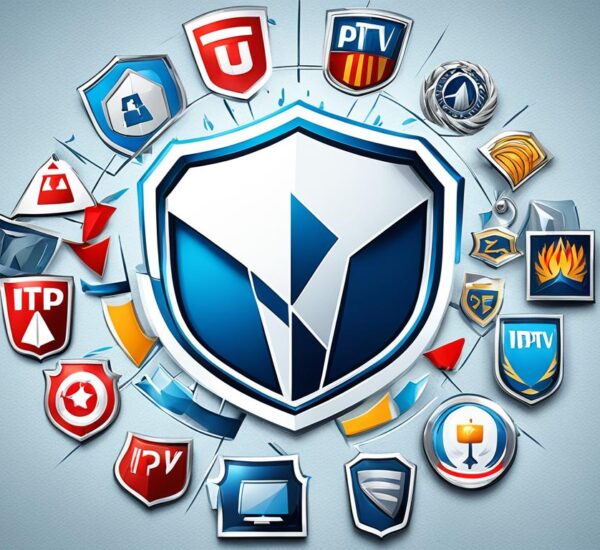Are you still relying on traditional cable TV for your entertainment needs? Or have you heard about the latest trend of IPTV and wondering how it compares? Whether you’re a fan of streaming services or a cable loyalist, it’s essential to understand the key differences and similarities between the two options to make an informed decision.
With the rise of internet-based television, IPTV has gained popularity for its convenience and extensive content offerings. But how does it stack up against traditional cable TV? Does it really provide a better viewing experience? And most importantly, is it worth making the switch?
Key Takeaways:
- Understanding the key differences and similarities between IPTV and traditional cable TV is crucial for making an informed entertainment choice.
- IPTV offers the advantage of streaming over the internet, providing access to a wide range of channels and on-demand content.
- Traditional cable TV provides reliability, a proven channel lineup, and features like DVR and on-demand content.
- Factors to consider when choosing between IPTV and traditional cable TV include technology, cost, channel options, and user experience.
- Streaming services have emerged as a popular alternative to both IPTV and traditional cable TV, offering unique content and subscription models.
Understanding IPTV
IPTV, or internet-based television, is a modern streaming service that has revolutionized the way we consume entertainment. Unlike traditional cable TV, which relies on physical infrastructure and broadcasting signals, IPTV delivers television programming and on-demand content through the internet.
One of the key benefits of IPTV is its versatility. With internet-based television, users can access a wide range of channels, including local and international options, right from the comfort of their devices. Whether it’s live sports, news updates, or your favorite TV shows, IPTV offers a vast array of content to cater to different interests and preferences.
IPTV services also provide a convenient and flexible viewing experience. Users can stream content on various devices, such as smart TVs, smartphones, tablets, or computers, making it accessible anytime, anywhere.
Not only does IPTV offer a diverse channel selection, but it also provides access to on-demand content. Users can choose from a library of movies, TV series, documentaries, and other programs, enabling them to watch what they want, when they want, without being restricted by scheduled programming.
Benefits of IPTV:
- Wide range of channels, including international options
- Flexible streaming on multiple devices
- Access to on-demand content
- Freedom to watch TV anytime, anywhere
- Eliminates the need for physical cables and equipment
“IPTV has transformed the way we consume television. Its internet-based nature allows for a more personalized and flexible entertainment experience, offering a vast selection of channels and on-demand content.” – John Smith, IPTV Enthusiast
In conclusion, IPTV brings the future of television to our fingertips. With its internet-based approach and numerous benefits, such as a wide channel selection and on-demand content, IPTV provides a superior viewing experience compared to traditional cable TV.
Traditional Cable TV Features
When it comes to traditional cable TV, there are several features that set it apart from other television options. Let’s take a closer look at some of the key features and benefits that traditional cable TV offers:
1. Extensive Channel Lineup
One of the biggest advantages of traditional cable TV is its extensive channel lineup. With a wide variety of channels available, viewers can enjoy a diverse range of programming, including news, sports, entertainment, and more. Cable providers often offer packages with different channel options to cater to individual preferences and interests.
2. Reliability and Signal Quality
Traditional cable TV is known for its reliable signal quality, allowing viewers to enjoy uninterrupted entertainment. Unlike internet-based television services that may be affected by factors like internet speed and connectivity issues, cable TV delivers consistent and stable signal reception. This makes it an ideal choice for those seeking a reliable viewing experience.
3. DVR and On-Demand Content
Another major feature of traditional cable TV is the availability of features like DVR (Digital Video Recorder) and on-demand content. With a DVR, users can easily record their favorite shows and watch them at their convenience. Additionally, cable providers often offer on-demand content, allowing viewers to access a vast library of movies, TV shows, and other entertainment options on-demand.
4. Interactive Program Guides
Traditional cable TV also provides interactive program guides, making it easier for viewers to navigate through channels, discover new shows, and plan their viewing schedules. These user-friendly guides display detailed information about each program, including its schedule, description, and sometimes even user ratings or reviews.
With its extensive channel lineup, reliable signal quality, and additional features like DVR and on-demand content, traditional cable TV continues to be a popular choice for many viewers.
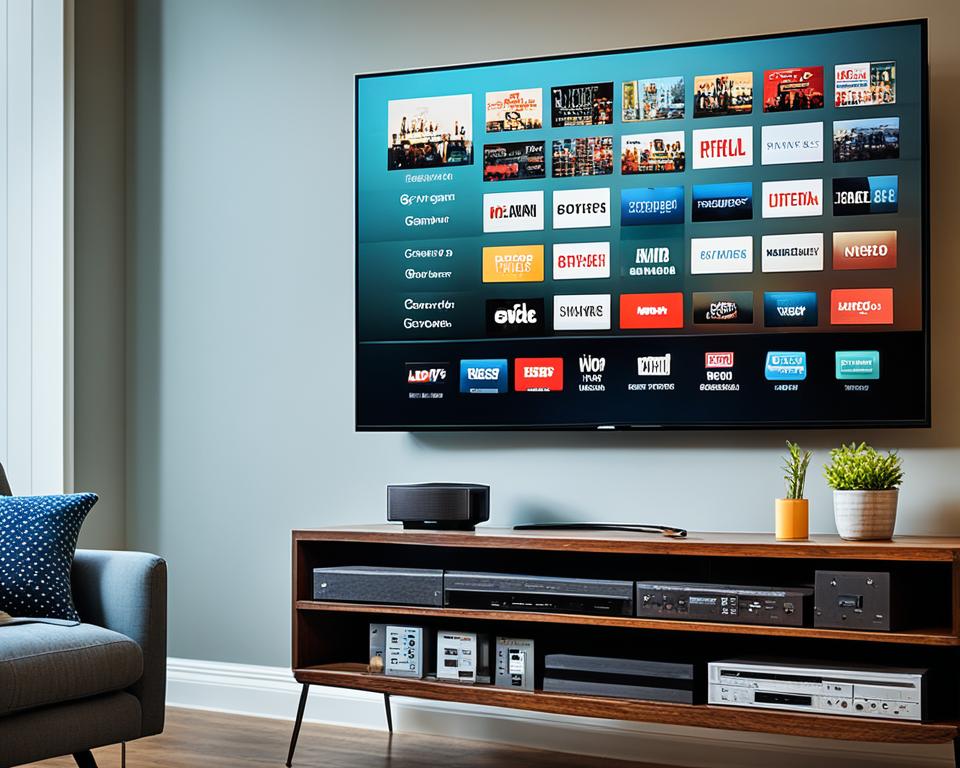
Key Differences Between IPTV and Traditional Cable TV
When comparing IPTV and traditional cable TV, several key differences emerge. These differences span various aspects, including technology, cost, channel options, and user experience. Understanding these distinctions is crucial for individuals seeking to make an informed decision regarding their television service.
Technology
One of the fundamental differences between IPTV and traditional cable TV lies in the underlying technology. IPTV is internet-based television, delivered through streaming services over an internet connection. On the other hand, traditional cable TV utilizes coaxial cables to transmit signals to a subscriber’s television set.
Cost
Cost is another significant contrast between IPTV and traditional cable TV. IPTV tends to offer more affordable options compared to cable TV, as it typically provides flexible subscription plans, allowing viewers to choose the channels they want to access. In contrast, cable TV packages often include a predetermined bundle of channels, which may result in higher costs.
Channel Options
When it comes to channel options, IPTV often outshines traditional cable TV. IPTV offers a wide range of channels, including international and niche content, with the flexibility to add or remove channels based on personal preferences. Cable TV, on the other hand, provides a predefined channel lineup, which may limit the variety of programming available to viewers.
User Experience
The user experience of IPTV and traditional cable TV also differs significantly. IPTV allows users to access content on-demand, pause, rewind, and skip commercials with ease. Additionally, IPTV integrates seamlessly with other popular streaming services, providing a comprehensive entertainment experience. In contrast, cable TV relies on predetermined schedules and often lacks the flexibility and convenience offered by IPTV.
In the realm of IPTV, viewers are provided with a level of control and customization that traditional cable TV cannot match. The ability to choose preferred content, tailor channel lineups, and enjoy on-demand programming makes IPTV an attractive option for those seeking a personalized television experience.
| IPTV | Traditional Cable TV | |
|---|---|---|
| Technology | Internet-based | Coaxial cables |
| Cost | Flexible subscription plans | Predefined bundle packages |
| Channel Options | Wide range, customizable | Predefined lineup |
| User Experience | On-demand, personalized | Predetermined schedules |
Similarities Between IPTV and Traditional Cable TV
While IPTV and traditional cable TV may have their differences, they also share some commonalities. Understanding these similarities can help viewers make informed decisions about their television preferences. Here are some key areas where IPTV and traditional cable TV align:
Content Availability
Both IPTV and traditional cable TV offer a wide range of content options to viewers. From live sports and news to movies and TV shows, subscribers can access a diverse selection of entertainment. Whether it’s through streaming services or cable channels, viewers can enjoy their favorite content at their convenience.
Quality
When it comes to picture and sound quality, both IPTV and traditional cable TV strive to deliver high-definition programming. With advancements in technology, both options offer crisp visuals and immersive audio, enhancing the overall viewing experience.
Purpose
At their core, IPTV and traditional cable TV share the same purpose – to deliver television programming to viewers. Whether it’s through internet-based streaming or cable infrastructure, the ultimate goal is to provide access to entertainment, information, and cultural content.
“IPTV and cable TV may have different delivery methods, but they both aim to connect viewers to their favorite shows and channels.” – TV industry expert
Comparison of Similarities Between IPTV and Traditional Cable TV
| IPTV | Traditional Cable TV |
|---|---|
| Offers a wide range of content options | Provides access to a diverse selection of entertainment |
| Delivers high-definition programming | Strives for crisp visuals and immersive audio |
| Delivers television programming to viewers | Provides access to entertainment, information, and cultural content |
Despite their similarities, it’s essential for viewers to consider their specific needs and preferences when choosing between IPTV and traditional cable TV. Both options offer unique features and benefits, and understanding the similarities can help inform the decision-making process.
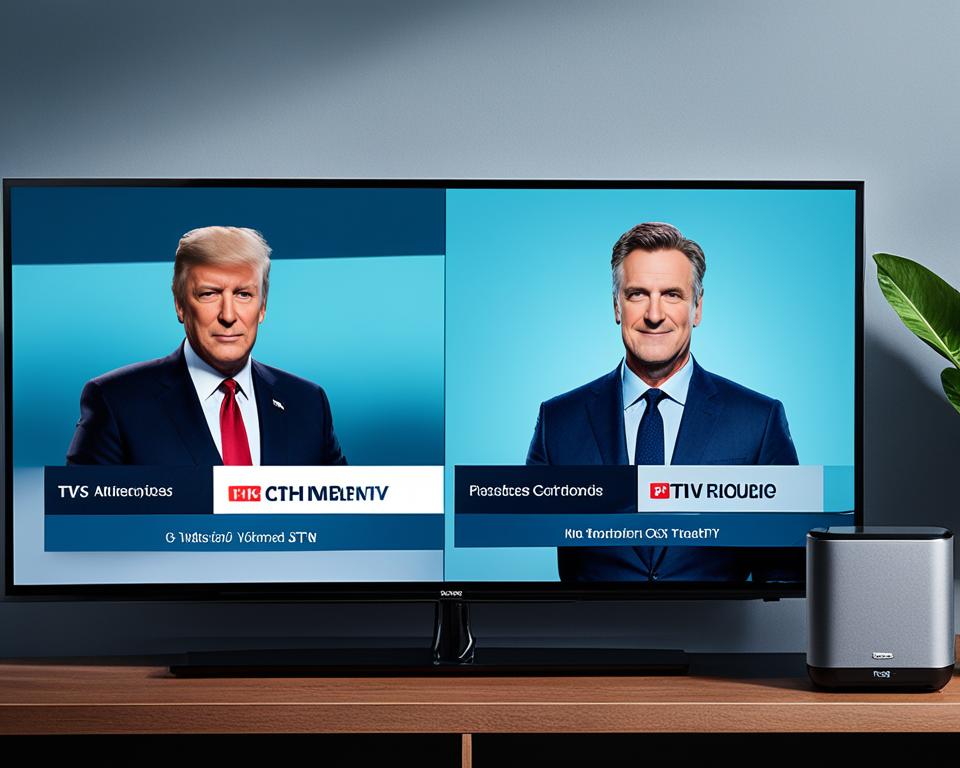
Benefits of Choosing IPTV
When it comes to enjoying television content, the traditional cable TV model is rapidly being overshadowed by innovative streaming services like IPTV. Choosing IPTV over cable TV offers numerous benefits that appeal to modern viewers. Let’s explore some of the advantages of opting for IPTV:
Flexibility
IPTV provides unrivaled flexibility in terms of content consumption. Unlike cable TV, which limits viewers to predefined channel lineups, IPTV allows users to select and stream their preferred content on-demand. This means you can watch what you want, when you want, without being tied to a set schedule.
Cost Savings
One of the most significant benefits of choosing IPTV is cost savings. Traditional cable TV often comes with hefty monthly subscription fees, surprise charges, and equipment rental costs. In contrast, IPTV services are typically more affordable, providing access to a vast range of channels and content at a fraction of the price.
Access to On-Demand Content
IPTV offers a vast library of on-demand content, including movies, TV shows, and documentaries. With cable TV, access to on-demand content is limited and requires additional subscriptions to services like pay-per-view and premium channels. IPTV eliminates these constraints, allowing you to explore a world of entertainment whenever it suits you.
Integration with Other Streaming Services
Another advantage of IPTV is its compatibility with other streaming services. Many IPTV providers offer the integration of popular streaming platforms like Netflix, Hulu, and Amazon Prime Video. This integration allows viewers to access all their favorite content from different streaming services in one place, providing a seamless and streamlined entertainment experience.
Choosing IPTV over cable TV provides flexibility, cost savings, access to on-demand content, and the convenience of integrated streaming services. It offers a superior viewing experience tailored to the individual preferences and needs of modern audiences.
| Benefits | IPTV | Cable TV |
|---|---|---|
| Flexibility | ✅ | ❌ |
| Cost Savings | ✅ | ❌ |
| Access to On-Demand Content | ✅ | ❌ |
| Integration with Other Streaming Services | ✅ | ❌ |
Factors to Consider when Choosing between IPTV and Traditional Cable TV
When deciding between IPTV and traditional cable TV, it’s essential to consider several factors that will help you make an informed choice. By evaluating your budget, desired channel lineup, internet connection reliability, and personal preferences, you can determine which option aligns best with your needs.
1. Budget
One of the primary considerations when choosing between IPTV and cable TV is your budget. IPTV often offers more cost-effective options compared to traditional cable TV, as it eliminates the need for expensive infrastructure and equipment. However, it’s important to evaluate the pricing plans and subscription models offered by both options to ensure they fit within your financial constraints.
2. Desired Channel Lineup
Consider the channels you want to access when evaluating IPTV and traditional cable TV. While cable TV typically offers a wide range of channels, IPTV allows for greater flexibility in terms of channel selection. With IPTV, you can choose specific channel packages or even opt for à la carte options to customize your viewing experience.
3. Internet Connection Reliability
Since IPTV relies on an internet connection to stream content, it’s crucial to assess the reliability of your internet service provider. If you have a stable and high-speed internet connection, IPTV can provide seamless streaming and an uninterrupted viewing experience. However, if your internet connection is unreliable or prone to frequent outages, traditional cable TV may be a more reliable option.
4. Personal Preferences
Your personal preferences, such as the type of content you enjoy and the devices you prefer to use for watching TV, should also influence your decision. IPTV offers the convenience of streaming content on various devices, including smartphones, tablets, smart TVs, and streaming media players. On the other hand, if you prefer traditional TV watching experiences, cable TV may be a better fit.
Consider your budget, desired channel lineup, internet connection reliability, and personal preferences to make an informed choice between IPTV and traditional cable TV.
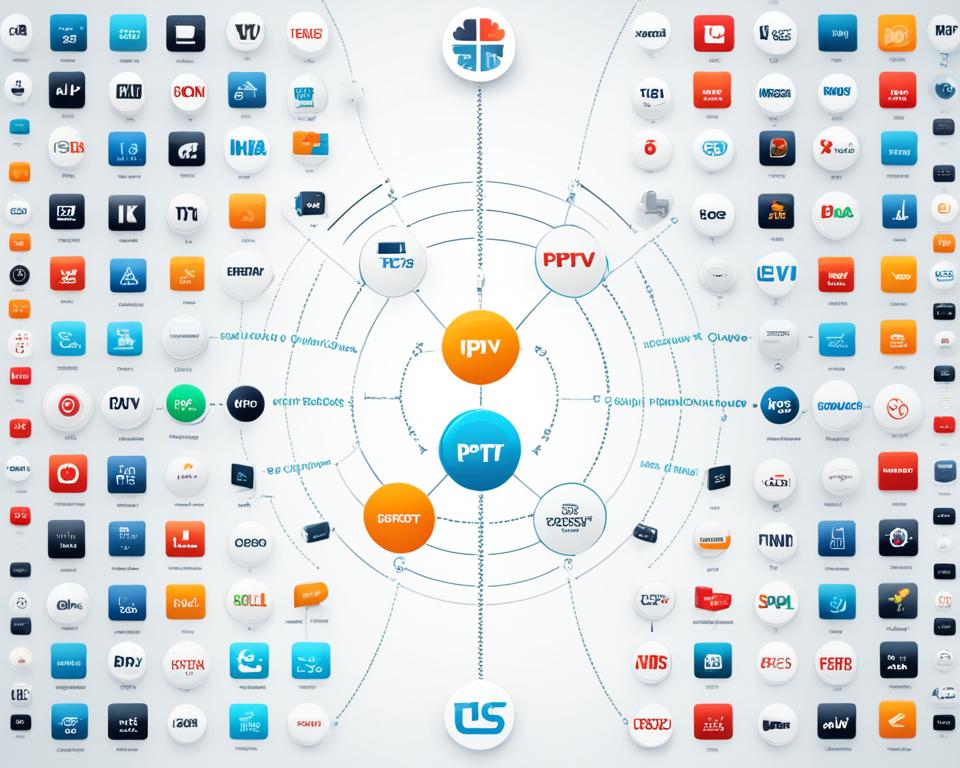
| IPTV | Traditional Cable TV | |
|---|---|---|
| Cost | Varies based on subscription plans and additional features |
Higher upfront costs and monthly fees |
| Channel Lineup | Customizable channel packages, à la carte options |
Wide range of channels |
| Reliance on Internet | Requires stable and high-speed internet connection |
No reliance on internet |
| Device Compatibility | Stream on various devices (smartphones, tablets, smart TVs, streaming media players) |
Traditional TV viewing |
| Flexibility | On-demand content, flexible subscription options |
Limited on-demand content, traditional subscription models |
Evaluating Streaming Services as an Alternative to Cable TV
With the increasing popularity of streaming services, many consumers are considering them as a viable alternative to both IPTV and traditional cable TV. Streaming services offer a wide range of benefits, including flexibility, convenience, and a vast selection of content. Let’s explore the world of streaming services and their role in the internet TV landscape.
Popular Streaming Platforms
There’s no shortage of streaming platforms to choose from, each with its own unique offerings. Some of the most popular ones include:
- Netflix: Known for its extensive library of movies, TV shows, and original content, Netflix has become a household name in the streaming industry.
- Amazon Prime Video: As part of the Amazon Prime subscription, Prime Video offers a diverse range of content, including exclusive movies and shows.
- Hulu: With a focus on current TV shows and a vast catalog of on-demand content, Hulu is a popular choice for those who want to keep up with their favorite series.
- Disney+: Ideal for fans of Disney, Pixar, Marvel, and Star Wars, Disney+ offers a wide range of family-friendly content.
Subscription Models
Streaming services typically offer various subscription models to cater to different user preferences. These models may include:
- Monthly Subscription: Users pay a fixed monthly fee to access the streaming service’s content library. This model allows for flexibility, as users can cancel or change their subscription at any time.
- Bundle Options: Some streaming services offer bundle options, where users can subscribe to multiple platforms at a discounted price. Bundles often include popular platforms like Disney+, Hulu, and ESPN+.
Differences in Content Offerings
Each streaming platform has its own unique content library, catering to different genres, demographics, and interests. While some services focus on original content, others offer a variety of licensed movies and TV shows. Users should consider their preferences and viewing habits when evaluating the content offerings of different streaming services.
“Streaming services have revolutionized the way we consume television content. With a wide range of platforms and subscription options available, viewers now have unprecedented control over what, when, and how they watch.”
Evaluating streaming services as an alternative to cable TV requires a thoughtful analysis of the available platforms, subscription models, and content offerings. By understanding the strengths and limitations of streaming services, consumers can make an informed decision that aligns with their entertainment needs and preferences.
Conclusion
After comparing the essentials of IPTV vs Traditional Cable TV, it’s clear that both options have their own merits and drawbacks. When making a decision, it’s crucial to consider individual preferences and needs.
IPTV offers the convenience of streaming television content over the internet, providing a wide range of channels and on-demand access. It allows viewers to enjoy flexibility, cost savings, and integration with other streaming services. On the other hand, traditional cable TV boasts a reliable connection and familiar features like DVR and on-demand content.
There are key differences between IPTV and traditional cable TV, including the technology used, cost structures, channel options, and user experience. IPTV is more internet-based, whereas traditional cable TV relies on physical infrastructure. Additionally, IPTV allows for greater customization of channel packages, while cable TV may offer a more extensive lineup.
Ultimately, choosing between IPTV and traditional cable TV is a personal decision. Consider factors such as budget, desired channel lineup, internet connection reliability, and personal preferences. Individuals seeking flexibility and cost savings may lean towards IPTV, while those valuing a reliable connection and familiar features might opt for traditional cable TV. It’s important to evaluate and select the option that best aligns with one’s viewing habits and requirements.
FAQ
What is the difference between IPTV and traditional cable TV?
What are the benefits of choosing IPTV over traditional cable TV?
What features are available with traditional cable TV?
Are there any similarities between IPTV and traditional cable TV?
What factors should I consider when choosing between IPTV and traditional cable TV?
Are streaming services a viable alternative to both IPTV and traditional cable TV?
